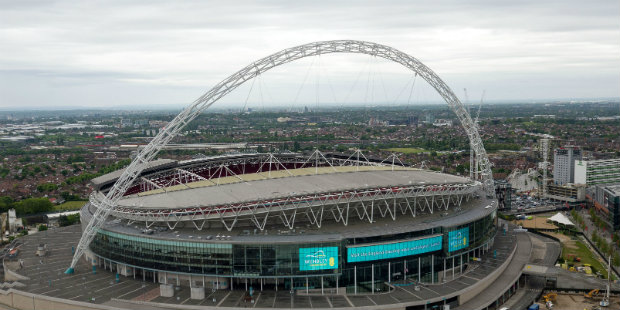Khan denies plan to move Fulham to Wembley

Fulham owner Shahid Khan has written to every Football Association councillor to assure them he has no intention of moving the club to Wembley if his proposed purchase of the stadium is approved.
The American billionaire’s £900million offer for Wembley is being discussed by the 127-strong council on Thursday, with a significant number in the room still strongly opposed to the idea of selling the national stadium, even if the FA has pledged to spend the windfall on grassroots facilities.
Some of this opposition is emotional but some is based on concerns about Khan’s motives for buying the stadium, which was reopened in 2007 after a £757million rebuild, including a belief that he wants to base both his National Football League team, the Jacksonville Jaguars, and Fulham there.
Fulham’s former assistant director of football Craig Kline has resurfaced this week after his acrimonious exit from the club a year ago, claiming that Khan really plans to build luxury flats at Craven Cottage – an allegation Fulham has dismissed as “nonsense”.
In his letter, which was sent on Friday, Khan wrote: “When I was privileged to become chairman of Fulham in 2013, I immediately encountered rumours as to what this meant for the future of our home ground of Craven Cottage and, for that matter, the club itself.
“My word at the time was I would invest in the club and the renovation of Craven Cottage so it would always be the lifetime and spiritual home of Fulham, but only in a manner that would be respectful of the neighbourhood while also delivering economic and quality of life benefits that would serve all Londoners every day of the year.
“Committing to doing the right thing, and then doing it right, was the only path I would consider.”

He then explained that “years of careful planning and communication with every stakeholder imaginable” will enable him to build a new Riverside Stand at the 122-year-old stadium, adding 5,000 to the ground’s current 25,000 capacity.
This experience, he wrote, proves that “a new era for Craven Cottage is on the horizon”, just as it could be for Wembley, a venue that has already fallen “a stage or two behind newer stadiums that have opened recently in Europe alone”.
The FA’s chief financial officer Mark Burrows said much the same thing in a Wembley sale presentation to the bosses of county FAs on Tuesday, adding that selling the stadium would save the national governing body £72million in maintenance costs at Wembley.
Khan has spent millions upgrading the Jaguars’ current home in north Florida, which now has the two largest video screens in world sport, two swimming pools and a dog park for fans who want to bring their pets to the game.
“Wembley Stadium must be the global standard in every sense – technology, hospitality, the visitor experience, the athlete expectation and much more,” wrote Khan.
“As I’ve done with my investment in the NFL stadium in Jacksonville and we are about to see with Fulham and Craven Cottage, I will protect what we all agree is wonderful about Wembley Stadium and be steadfast, and respectful, in making sure the Wembley Stadium of the future will never have an equal.
“I owe it to you to be a responsible owner and operator of Wembley Stadium, which under my guardianship will at all times be three things – the national stadium of England, the traditional home of English football, and one of the world’s finest venues for sport and entertainment.”
Khan’s letter finished with an offer to let a committee of FA councillors continue to play “a meaningful advisory role on all FA-related stadium matters” and wrote “it goes without saying that you and all FA Council members will always be welcomed as our guest for FA events at Wembley”.
